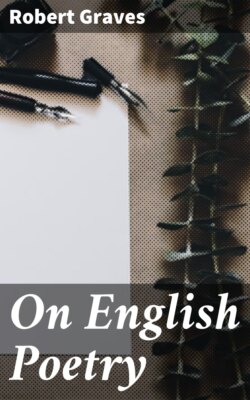Читать книгу On English Poetry - Robert Graves - Страница 6
На сайте Литреса книга снята с продажи.
IV
CONFLICT OF EMOTIONS
ОглавлениеTable of Contents
THE suggestion that an emotional conflict is necessary for the birth of true poetry will perhaps not be accepted without illustrative instances. But one need only take any of the most famous lines from Elizabethan drama, those generally acknowledged as being the most essential poetry, and a battle of the great emotions, faith, hope or love against fear, grief or hate, will certainly appear; though one side may indeed be fighting a hopeless battle.
When Marlowe’s Doctor Faustus is waiting for the clock to strike twelve and the Devil to exact his debt, he cries out:
That Time may cease and midnight never come
O lente, lente currite noctis equi.
Scholastic commentators have actually been found to wonder at the “inappropriateness” of “Go slowly, slowly, coursers of the night,” a quotation originally spoken by an Ovidian lover with his arms around the mistress from whom he must part at dawn. They do not even note it as marking the distance the scholar Faustus has travelled since his first dry-boned Latin quotation Bene disserere est finis logices which he pedantically translates:
Is, to dispute well, Logicke’s chiefest end.
Far less do they see how Marlowe has made the lust of life, in its hopeless struggle against the devils coming to bind it for the eternal bonfire, tragically unable to find any better expression than this feeble over-sweetness; so that there follows with even greater insistence of fate:—
